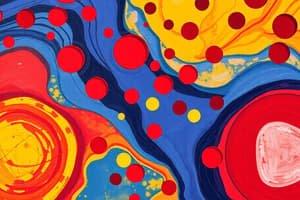Podcast
Questions and Answers
Why is heparin not taken orally?
Why is heparin not taken orally?
- Because it is destroyed by gastric HCl (correct)
- Because it has a delayed onset of action
- Because it is not absorbed orally
- Because it does not pass the blood-brain barrier
What is the mechanism of action of heparin?
What is the mechanism of action of heparin?
- Inhibiting the action of vitamin K
- Activating Anti-Thrombin III to inhibit clotting factors (correct)
- Inhibiting the synthesis of clotting factors
- Inhibiting the action of vitamin K epoxide reductase
What is the effect of warfarin on vitamin K?
What is the effect of warfarin on vitamin K?
- Warfarin converts vitamin K to its oxidized form
- Warfarin inhibits the conversion of vitamin K to its oxidized form
- Warfarin activates vitamin K
- Warfarin inhibits vitamin K epoxide reductase (correct)
What is the result of warfarin's inhibition of vitamin K epoxide reductase?
What is the result of warfarin's inhibition of vitamin K epoxide reductase?
What is the duration of action of heparin?
What is the duration of action of heparin?
What is the mechanism of action of heparin on clotting factors?
What is the mechanism of action of heparin on clotting factors?
What is the primary function of anticoagulants?
What is the primary function of anticoagulants?
How many proteins are responsible for blood coagulation?
How many proteins are responsible for blood coagulation?
Which pathway is activated after tissue injury, releasing factor III?
Which pathway is activated after tissue injury, releasing factor III?
What is the final product of the coagulation cascade?
What is the final product of the coagulation cascade?
What is the source of heparin?
What is the source of heparin?
How is heparin administered?
How is heparin administered?
Flashcards are hidden until you start studying
Study Notes
Anticoagulants
- Anticoagulants are drugs that interfere with the coagulation of blood.
Blood Coagulation
- There are two pathways: Extrinsic and Intrinsic.
- 12 proteins are responsible for blood coagulation.
Extrinsic Pathway
- After tissue injury, factor III is released from the injured tissue.
- Factor III activates factor VII, which activates factor VIII, then factor X, and finally factor II (prothrombin).
- Prothrombin is converted to thrombin, which activates factor I (fibrinogen) to form fibrin (blood clot).
Intrinsic Pathway
- After tissue injury, factor XII is released from the injured tissue, which activates factor XI, then factor IX, and finally factor X.
- Factor X is activated, leading to the formation of thrombin and fibrin.
Heparin vs Warfarin
- Heparin: natural, stored in mast cells, parenteral (I.V. or S.C.), immediate onset of action, short duration (4-8 hours).
- Warfarin: synthetic, oral (100% absorbed), delayed onset of action (1-2 days), long duration (5-7 days).
Heparin Mechanism
- Inhibits the activity of coagulation factors by activating anti-thrombin III.
- Anti-thrombin III inhibits the activity of factors II, X, XI, XII, and XIII (mainly factor X).
Warfarin Mechanism
- Liver synthesizes clotting factors (1, 9, 7, 2) with the aid of vitamin K.
- Vitamin K is converted to its oxidized form (vitamin K epoxide) during synthesis.
- Warfarin inhibits vitamin K epoxide reductase enzyme, preventing the regeneration of reduced form of vitamin K.
- As a result, the synthesis of clotting factors is stopped.
Studying That Suits You
Use AI to generate personalized quizzes and flashcards to suit your learning preferences.




